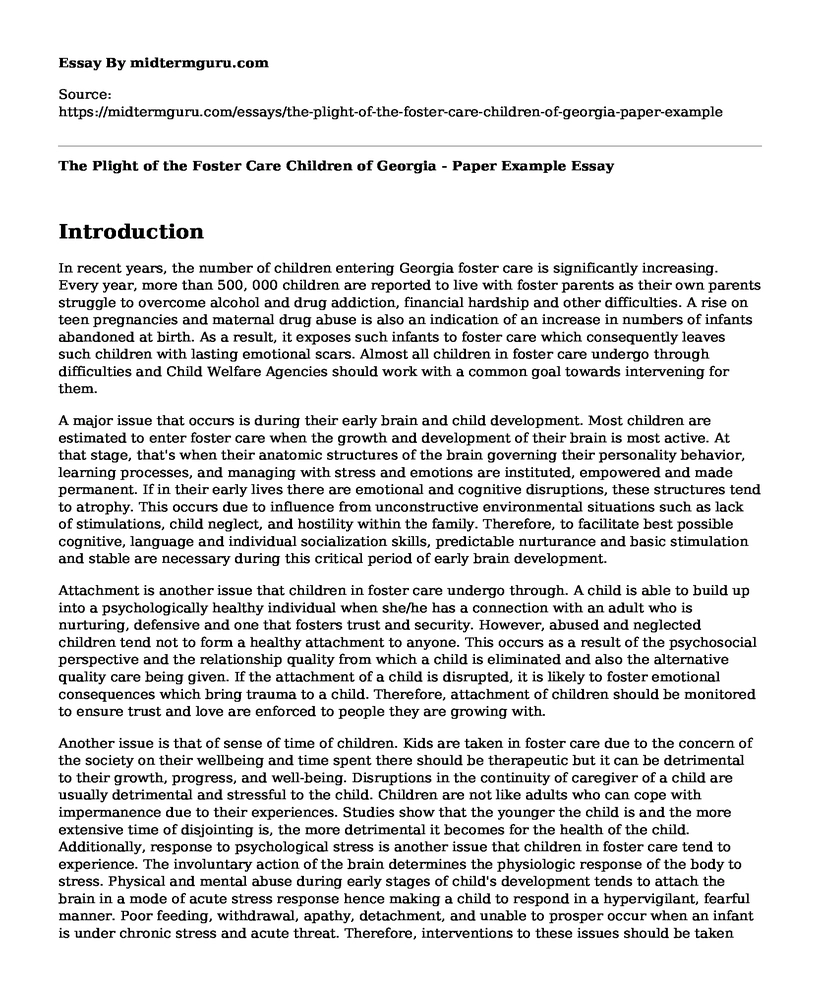Introduction
In recent years, the number of children entering Georgia foster care is significantly increasing. Every year, more than 500, 000 children are reported to live with foster parents as their own parents struggle to overcome alcohol and drug addiction, financial hardship and other difficulties. A rise on teen pregnancies and maternal drug abuse is also an indication of an increase in numbers of infants abandoned at birth. As a result, it exposes such infants to foster care which consequently leaves such children with lasting emotional scars. Almost all children in foster care undergo through difficulties and Child Welfare Agencies should work with a common goal towards intervening for them.
A major issue that occurs is during their early brain and child development. Most children are estimated to enter foster care when the growth and development of their brain is most active. At that stage, that's when their anatomic structures of the brain governing their personality behavior, learning processes, and managing with stress and emotions are instituted, empowered and made permanent. If in their early lives there are emotional and cognitive disruptions, these structures tend to atrophy. This occurs due to influence from unconstructive environmental situations such as lack of stimulations, child neglect, and hostility within the family. Therefore, to facilitate best possible cognitive, language and individual socialization skills, predictable nurturance and basic stimulation and stable are necessary during this critical period of early brain development.
Attachment is another issue that children in foster care undergo through. A child is able to build up into a psychologically healthy individual when she/he has a connection with an adult who is nurturing, defensive and one that fosters trust and security. However, abused and neglected children tend not to form a healthy attachment to anyone. This occurs as a result of the psychosocial perspective and the relationship quality from which a child is eliminated and also the alternative quality care being given. If the attachment of a child is disrupted, it is likely to foster emotional consequences which bring trauma to a child. Therefore, attachment of children should be monitored to ensure trust and love are enforced to people they are growing with.
Another issue is that of sense of time of children. Kids are taken in foster care due to the concern of the society on their wellbeing and time spent there should be therapeutic but it can be detrimental to their growth, progress, and well-being. Disruptions in the continuity of caregiver of a child are usually detrimental and stressful to the child. Children are not like adults who can cope with impermanence due to their experiences. Studies show that the younger the child is and the more extensive time of disjointing is, the more detrimental it becomes for the health of the child. Additionally, response to psychological stress is another issue that children in foster care tend to experience. The involuntary action of the brain determines the physiologic response of the body to stress. Physical and mental abuse during early stages of child's development tends to attach the brain in a mode of acute stress response hence making a child to respond in a hypervigilant, fearful manner. Poor feeding, withdrawal, apathy, detachment, and unable to prosper occur when an infant is under chronic stress and acute threat. Therefore, interventions to these issues should be taken and treated as an issue of urgency and profound significance for the sake of the well-being of a child.
Bibliography
Jurkovic, Gregory J. Lost childhoods: The plight of the parentified child. Routledge, 2014.
Lindsey, Elizabeth W., and John S. Wodarski. "Foster family care review by judicial-citizen panels: an evaluation." Child welfare 65, no. 3 (2010).
Miller, Peter M., Peter A. Gorski, Deborah Ann Borchers, Jerri Ann Jenista, Chet D. Johnson, Neal D. Kaufman, Susan E. Levitzky et al. "Developmental issues for young children in foster care." Pediatrics 106, no. 5 (2012): 1145-1150. http://pediatrics.aappublications.org/content/106/5/1145
Sankaran, Vivek S., and Christopher Church. "Easy Come, Easy Go: The Plight of Children Who Spend Less Than Thirty Days in Foster Care." U. Pa. JL & Soc. Change 19 (2016): 207.
Cite this page
The Plight of the Foster Care Children of Georgia - Paper Example. (2022, Nov 07). Retrieved from https://midtermguru.com/essays/the-plight-of-the-foster-care-children-of-georgia-paper-example
If you are the original author of this essay and no longer wish to have it published on the midtermguru.com website, please click below to request its removal:
- Analysis and Presentation of Data in Pharmacology - Essay Sample
- Essay on WIC (Women, Infant, and Children) Program: Pregnant Women With Anemia
- Evidence-Based Practice Question in Clinical Practice - Paper Example
- Have Americans Given Up on Losing Weight? - Paper Example
- Sleep Deprivation: Research Paper
- Research Proposal: Malaria and Effectiveness of Using Insecticide-Treated Mosquito Nets
- Epidemiology of PTSD: Prevalence Across Countries - Research Paper







